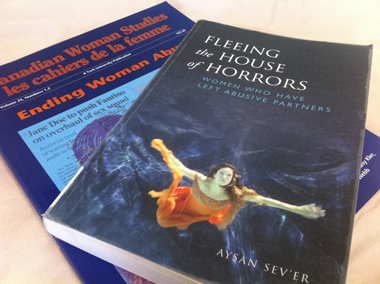
Are you interested in human rights? Want to learn about systemic issues related to gender equality? WGST 422 (Violence Against Women: A Global Perspective) might just be the course for you. According to the syllabus, the course “examines the subject of violence against women from a human rights perspective” and “looks at the impact that specific social, cultural, political, and economic factors have on women’s vulnerability to and experience of violence worldwide.”
Dr. Karen Nielsen has “been part of AU for about 25 years, long before computers and email!” She currently serves as instructor for two graduate courses and tutors several undergraduate courses in the areas of Women’s and Gender Studies and Criminal Justice, including WGST 422.
The material in WGST 422 is “wide ranging,” says Nielsen. “Theories of violence against women are critically evaluated, as are the politics of violence including the individual and institutional practices that maintain and perpetuate the violence. It also looks at specific issues such as the effects of development and globalization on women’s vulnerability to violence.”
When asked why this course could be valuable, Nielsen offers an in-depth answer:
I believe that this course is very important especially in today’s interconnected world where all of our students are increasingly exposed to violence and gender based discrimination even beyond their own communities. This course takes the approach that violence against women is a consequence of gender-based discrimination and gender inequality ?a pervasive, world-wide inequality that escalates and perpetuates the imbalance of power between men and women. Violence against women and girls is a huge human rights issue all over the world; they are routinely subjected to torture, starvation, humiliation, and murder just because they are female. In spite of this and in spite of a number of UN Nations Declarations about violence against women, women’s rights are not commonly seen as human rights. The overarching goal WGST 422 is to give students a human rights perspective of violence against women, both nationally and internationally.
To help students accomplish this goal, “as with all AU courses, students receive all of the materials they need to complete the course. There are texts and most importantly, a detailed Study Guide that guides the students through the five units that comprise this course. There are also suggested reading lists and of course, students have access to hundreds of relevant journals and books through AU’s library.”
Dr. Deborah Foster also serves as a tutor for WGST 422, and adds that students’ final grades are “based mostly on research papers, some of which only require research from the course materials while others expect students to research the topic of violence against women using AU library resources. This is a fourth year course, so students are expected to be able to critically evaluate material at a senior undergraduate level and effectively reference this material using a referencing style such as APA.”
Student Mistelle Montague says that WGST 422 has been her overall favourite course, and that it “pushed [her] toward pursuing gender studies more seriously.” When asked about why she enjoyed the course, Montague explains that “the course never felt like a chore to complete. It helped that my tutor was fantastic! The materials kept me engaged and everything was easy to follow.”
Montague continues: “The course focuses on violence against women on a global level. It touches on intimate partner violence, the sex trade, and various factors that play a role in women’s vulnerability – for example the societal promotion of women as a subordinate and the ?other?.”
“The challenge to this particular course is in the readings,” Montague says. “They are in depth and at times I did need to walk away and take a break.” She also offers a word of caution: “there is sensitive subject matter involved” in this course, and “it could definitely be a trigger for some people.”
“Students may find some of the material emotionally challenging,” Nielsen explains, because “it is a difficult subject, especially the material that includes hearing the personal accounts of women who have been victims of violence.” She further notes though that “tutors, who have experience in this field, both academically and professionally, are always available to help their students to process the emotional impact.”
“Many of our students are women, and because of the prevalence of violence in Canada and world-wide, many of them will have experienced some level of gender based violence and discrimination. Their experiences certainly add another dimension in terms of learning but potential students should give thought to their own emotional well-being and ask themselves if they are ready to engage with this material. As I have already mentioned, tutors are available to help students to process the material both from an acade mic or emotional perspective.”
Bethany Tynes completed her MA in Integrated Studies through AU, and is a Canadian politics junkie.

